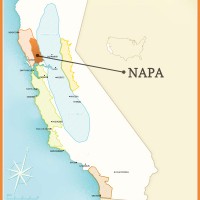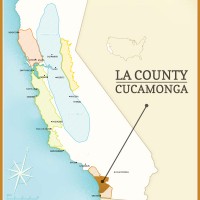Don’t turn your back on Zinfandel just yet. Once you learn its rich history in the United States and find out the nuances–and the good ones on the market, you’ll stock up for fall.

Is Zinfandel an American Grape?
Zinfandel is an immigrant like most Americans. Cuttings from the imperial gardens at Schönbrunn Palace, Vienna were brought to Boston hothouses in the 1820’s. Back then, it was a sign of wealth to have fresh grapes throughout the winter. It was appreciated for its ability to form perfect raisins.
Falling on Hard Times
When prohibition came, the wine business took heavy casualties. Vineyards survived by growing grapes for sacramental use but many of the Zinfandel vines were ripped out.
White Zinfandel Takeover!
By 1975 white wine was more popular than red. Responding to the need, Bob Trinchero of Trinchero and Sutter Home attempted to create a dry white wine fermenting zinfandel juice pressed off of the skins (since the skin is what adds color to red wine). The attempt was a disaster because of a stuck fermentation where not all the sugar fermented. It was pink and sweet. He released it anyway and wine drinkers loved it. Nowadays White Zinfandel accounts for 85% of Zinfandel produced.
How to Find Great Zinfandel
Learn the flavor Zinfandel has high acidity which is often described as tasting ‘spicy.’ Berry flavors are dominant, from strawberry to blackberry bramble, depending on the ripeness. If you like 5-spice powder, cloves and cinnamon look for oak-aged Zinfandel. If you like lighter and more delcate wines look for less oak.
Alcohol level matters Do you want a richer Zinfandel or a lighter Zinfandel? The easiest way to tell how a Zinfandel will feel is to look at the alcohol level. Riper Zinfandel grapes produce wines with higher alcohol. Riper = richer darker ‘sweeter’ tasting Zinfandel.
Zinfandel Tastes Different From Each California Region
Take note of where your favorite Zinfandel is from, chances are you prefer that region. Find out more about the major regions below!

Amador County and the Sierra Foothills
Body Medium – Full
Amador County produces the most jammy Zinfandels on the market. Flavors of raspberries and super ripe strawberries are dominant. Zinfandels from this area tend to be less spicey and rich with high alcohol content. The vineyards located farther into the hills produce more Zinfandels with tart raspberry and subtle smells of wet granite.
Four Vines, Sobon Estate, Montevina, Nevada City Winery, Lava Cap Winery
Lodi (Central Valley, Modesto)
Body Full
A large flat region in the central valley, Lodi is a major commercial winery area in California. Despite the homogeny of large commercial production, Zinfandels from Lodi typically have rich dark raspberry to mocha flavors followed by a smokey maple finish. I like to refer to this type of finish as a sweet-tannin finish, most likely due to use of well-toasted oak treatment. Regardless of technique, the Zinfandels of Lodi are easy to identify and delightfully unique.
Brazin, Earthquake, Klinker Brick, Seven Deadly Zins
Napa Valley
Body Full
Many of the acres of 90+ year old head-trained Zinfandel vines have been ripped out in favor of more profitable Cabernet Sauvignon. Of the remaining Zinfandel in the area, the wines are highly aromatic with notes of blackberry and black pepper. The wines typically exhibit both higher acidity and higher tannins which in turn makes them age-worthy.
Biale, Storybook Mountain, Turley, Frank Family, Brown Estate
Napa Hillside Vineyards
Body Medium-Full
Howell Mountain and Chiles (spoken like ‘child’) Valley AVAs have much cooler temperatures year-round than the valley floor. The wines from these areas tend to have more red-earth notes almost like cayenne pepper and a smokey-sweet tobacco finish. The Zinfandels in this area are incredible.
Red & Green Vineyards, Outpost Winery, D-Cubed
Sonoma (Including Dry Creek and Rockpile)
Before the Pinot craze hit Sonoma, there was Zinfandel. Sonoma receives more fog and cooler temperatures than Napa, making softer and more lush Zinfandel. In Dry Creek, wines get up to about 15.5% alcohol and are rich and round, with mocha and 5-spice powder. Need a crowd pleaser Zin? Sonoma Zinfandel will make a Merlot lover happy.
Dry Creek Vineryards, Seghesio, Kokomo Winery, Cellar No. 8
Paso Robles
Body Medium
The Zinfandel from Paso Robles are noticably more floral in character than others. By floral, think violets and roses along with the classic brambly raspberry flavors of Zinfandel.
Peachy Canyon, Opolo, Linn Colado, Chronic Cellars, J Dusi
Los Angeles / Riverside / Cucamonga
Body Full
LA County had mission wineries long before the wineries of Northern California. Today, ground-trained vines can be found nestled in between highway interchanges. With flavors ranging from blackberry to tart black cherry, the wines tend to have slightly higher acidity than their Lodi cousins. Carol Shelton, a longtime producer of wines from Rancho Cucamonga, makes a field blend which includes Zinfandel among a few other varietals such as Carignan and Petite Sirah.
Carol Shelton
Sources
Out of a Hot House by George Vierra edited by Morgan Guy Twain-Peterson from zinfandel.org
Zinfandel on wikipedia.org
Historic Vineyard Society in California






